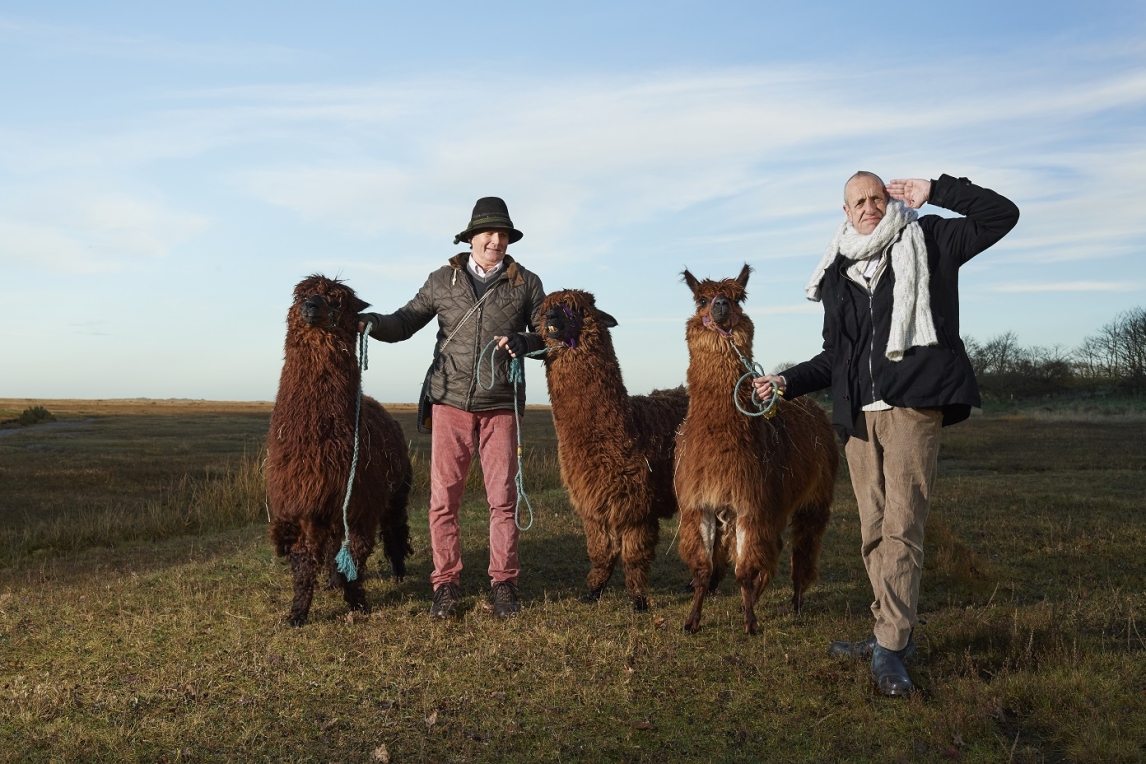Published on: Monday, 22 May 2017
Last updated: Thursday, 14 December 2017
By Arthur Smith
“In Wells-next-the-Sea alpaca treks are the new fish and chips”
Although I long ago hung up my football boots, recently retired from jogging and never really took to cage fighting, I still like a stimulating bout of exercise. Rambling is my game now. To walk for hours through a picturesque landscape breathing fine fresh air is an unbeatable way to relax, clear the mind and shrug off the excesses of metropolitan life.
Sometimes I go alone, sometimes with my partner and friends, while last month I explored the coastal marshes of North Norfolk in the delightful company of a small, colourful, furry creature with alarmingly uneven teeth, called Machu. Machu is an alpaca, the smallest of the South American species known as the camelid, and he really enjoys a stroll along a shore.
Machu lives, with 15 of his alpaca chums, in the back garden of a house in Stiffkey, a coastal village west of Sheringham. The house belongs to Ian Curtis, an enterprising local who, for a moderate fee, will take you on a wander with the alpacas along the nearby coastal paths for up to 4 hours. In warmer months, Ian and his shaggy team decamp to nearby Wells-next-the-Sea, where alpaca trekking has become a splendid holiday alternative to bird-watching, eating fish and chips or shivering on the beach.
So it is this bright, cold afternoon I find myself gently leading Machu along a path under a great big East Anglian sky chatting to Ian. Following close behind, my pal Judith and her charming eight-year-old daughter Skye hold the reins of their new friends, Pichu and Pedro.
Ian, who is also knowledgeable on local history, explains that that these animals make up one of the groups within his garden residents. Alpacas always form into small units of 2 or 3 members who each play a different role. In our gang Machu goes first and keeps a constant look out for any danger (they do not get on well with dogs). Pedro politely brings up the rear, while Pichu, to Skye’s laughing delight, is the playful one who grins toothily and stops for a roll around on a dry track (apparently this is a way of cleaning his coat).
Tourism is a big industry in these parts and eight years ago Ian spotted an alpaca-sized gap in the market. But where do you get an alpaca from? You don’t have to head to the Andes - you just have to look on the internet, Ian tells me. You can buy a male alpaca for £400 or less, but females cost more since they can give birth.
We walk on in the late afternoon sun and suddenly Machu makes a soft humming noise rather like a sceptical professor, “Hmmm…?” He and his colleagues are obviously friendly beasts and they look pleasingly ridiculous, too - like cute, miniature llamas, or perhaps camels who have bought a shaggy hipster coat and decided to go into showbiz. It is no surprise to learn that the treks are very popular with hen parties.
The light begins to fade and both camelids and humans lapse into a gentle, pastoral silence and we all listen to the soft wind, distant birdsong and murmuring sea. Far from their origins, these alpacas nevertheless exude a kind of innocent soothing contentment. As we make our way back to Ian’s place along the road passers-by wave and smile.
For more information about Alpaca Trekking, visit alpacatrekking.co.uk. Nearest station: Sheringham. Book your train ticket at greateranglia.co.uk



